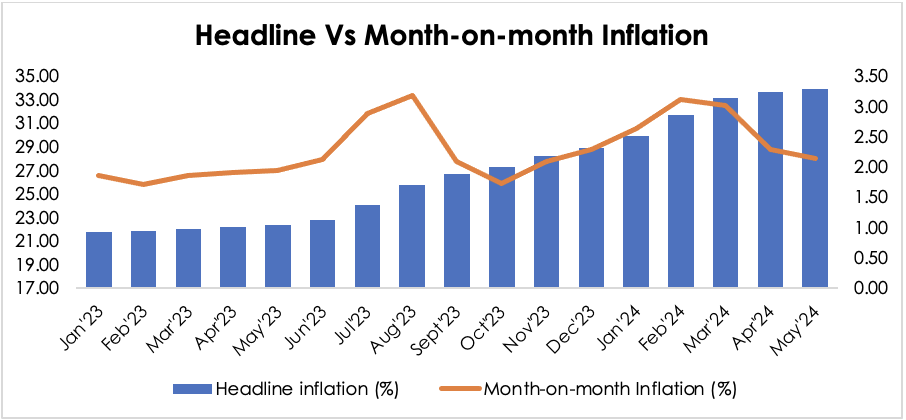Headline inflation up marginally to 33.95%
The National Bureau of Statistics published its May 2024 CPI and inflation report on June 15. Consistent with forecasts, Nigeria's headline inflation continued its upward trend for the 17th consecutive month but came in lower than most analysts anticipated. The consumer price index rose by 33.95%, a modest increase from 33.69% in April. Interestingly, month-on-month inflation, which provides a more current assessment of price changes, decreased for the third consecutive month to 2.14% from 2.29% in April.
 Is Inflation approaching an inflection point?
Is Inflation approaching an inflection point?
The slow pace of increase in headline inflation and the continued moderation in the monthly inflation sub-index is a positive signal that inflation may be approaching its peak. However, the planting season, which typically peaks at the end of the second quarter, coupled with the speculative effects of the minimum wage increase poses significant threats to price deceleration. This could mean that inflation would remain elevated for a longer period.
Is the MPC likely to soften it's pedal
The MPC is scheduled to convene again on July 22/23 to assess developments in the global and domestic economies and set the direction for monetary policy in the near term. So far in 2024, the committee has met three times, increasing the monetary policy rate by a cumulative 750 basis points to rein in inflation. While the MPC has maintained its hawkish stance in the last three meetings, there has been a noticeable deceleration in the pace of interest rate hikes. With the moderate increase in headline inflation and the sustained decline in the monthly inflation rate, expectations are that the MPC may adopt a less aggressive approach. However, the committee's decision will also be influenced by the inflation data for June, which will have been released before the meeting.
Inflation Breakdown
Food Inflation climbs to 40.66% - Nigeria now has the third highest food inflation in Africa
Like headline inflation, annual food inflation continued its upward trajectory for the 17th straight month, reaching 40.66% in May compared to 40.53% in April. However, monthly, it decreased by 0.22% to 2.28%. This decline primarily stems from reduced consumer demand due to constrained purchasing power and an increased tendency to save, driven by higher interest rates. Nigeria now ranks third among African nations with the highest food inflation, following South Sudan (186%) and Zimbabwe (105%).
Core Inflation edges higher by 0.2% to 27.04%
Core inflation, excluding volatile items such as food and energy costs, rose annually but decreased month-on-month. It increased by 0.2% to 27.04% year-on-year and decreased by 0.18% to 2.01% month-on-month. The annual core inflation rate now stands at 6.37% above the 364-day Treasury bills rate (20.67%), indicating a broader negative real rate of return compared to 6.14% last month.
Rural-Urban Inflation Gap widens to 4.52%
Yearly, urban and rural inflation rates rose by 0.34% and 0.18% respectively, reaching 36.34% and 31.82%. However, monthly figures showed that urban inflation decreased by 0.32% to 2.35%, whereas rural inflation saw a slight increase of 0.02% to 1.94%. The urban-rural inflation gap rose to 4.52% from 4.36% in April, reflecting the impact of higher logistics costs.
State-by-state inflation
The states with the lowest inflation rates in May were Borno (25.97%), Benue (27.74%) and Delta (28.67%). Bauchi recorded the highest inflation rate (42.30%), followed by Kogi (39.8%) and Oyo (37.73%).
 Impact on you
Impact on you

Tags:
Inflation
Consumer
Government
Corperates